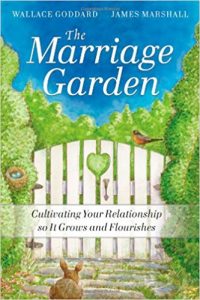How To Maintain Your Wifes Flower Garden
 A flourishing garden is the metaphor for marriage in this unique book. Marriages, like gardens, flourish when they are tended with care – watered, weeded and nurtured, according to the co-authors of "The Marriage Garden," H. Wallace Goddard and James P. Marshall.
A flourishing garden is the metaphor for marriage in this unique book. Marriages, like gardens, flourish when they are tended with care – watered, weeded and nurtured, according to the co-authors of "The Marriage Garden," H. Wallace Goddard and James P. Marshall.
Their book holds that "marriage follows the law of the harvest, which states that only patient, wise effort over time will result in a good crop." Are great gardens nothing more than happy accidents? Not at all, and neither are great marriages, the authors believe.
Goddard, who has written previously on parenting, is a professor of family life at the University of Arkansas in the Division of Agriculture Cooperative Extension Service. Marshall, an assistant professor in the same division, is a licensed marriage and family therapist.
In these authors' vision, husbands and wives are like master gardeners. A "master gardener" is someone who "carefully monitors the condition of a garden and judiciously acts to ensure its well-being," they explain. Thus, for example, whenever a husband and wife give each other the "gift of understanding," their action is "as refreshing and vital as cool water is to a parched plant."
The reality is that "relationships need care just as much as plants do," say Goddard and Marshall. However, they caution spouses, the care a marriage needs often comes not so much in the form of "big romantic acts" as in the form of "simple and consistent kindness." Focusing upon the value of simplicity, the authors write:
"Simply making time for our spouses and showing them understanding can help strengthen our marriage gardens."
I welcomed the understanding of "commitment" conveyed by this book. The authors affirm that "commitment is more than a steely resolve to stick with a relationship. It is also the resolve to keep investing in the relationship and to prevent distractions from destroying something sacred."
Within a relationship, commitment "does not have to be left to chance. It can be a choice," their book states. But the authors want couples to realize that commitment calls not only for "working hard," but for "working smart."
Thus, their book drives home the point that it is essential to bring intelligence to bear on marital commitment. For, say the authors, "when we are doing the wrong things, working harder at them won't help. Sometimes we must learn new ways."
"The Marriage Garden" includes many suggestions for helping a marriage to grow. It notes that "one of the clearest findings of research on marriage" is that "partnerships grow when we focus on the positive." The authors caution that while most couples "have smaller, garden-variety discontents, … the guaranteed way to make marriage worse is to think and talk endlessly about those irritations."
In urging couples not to allow their different personal qualities to "become major sources of contention," the authors recommend that spouses endeavor "to look at their differences as blessings, rather than as annoyances or major sources of conflict."
Husbands and wives are encouraged in "The Marriage Garden" to take steps to see things from each other's point of view. When it comes to solving problems, the authors are convinced events will unfold more smoothly if each spouse is willing "to identify and accept" his or her own role in the problems, instead of "seeking to blame" the other person.
This book judges it "not healthy for a marriage" when spouses undertake "spousal improvement projects" that represent one spouse's attempt to improve or change the other. "Accepting our spouses for who they are and focusing on changing ourselves is much healthier," the authors comment.
Compassion, attentive listening to each other and expressions of appreciation for each other are among the many other invaluable elements of a successful marriage garden, according to Goddard and Marshall. In marriage, they say, "we are being invited to learn how to see another person's point of view, to have compassion for our partner's pains, to share our time and resources with another person."
Can marriages continue to grow and flourish over time, despite the ups and downs of life? Yes, according to "The Marriage Garden," which views marriage as a challenge and an invitation to learn some "advanced lessons in humanity." In the authors' hopeful view, "marriage might be, as clergyman Joseph Barth has suggested, 'our last, best change to grow up.'"
About the reviewer
David Gibson is the former, now-retired editor of Origins, CNS Documentary Service.
Disclaimer: Book reviews do not imply and are not to be used as official endorsement by the USCCB of the work or those associated with the work. Book reviews are solely intended as a resource regarding publications that might be of interest to For Your Marriage visitors.
How To Maintain Your Wifes Flower Garden
Source: https://www.foryourmarriage.org/blogs/the-marriage-garden/
Posted by: craftratepand.blogspot.com

0 Response to "How To Maintain Your Wifes Flower Garden"
Post a Comment